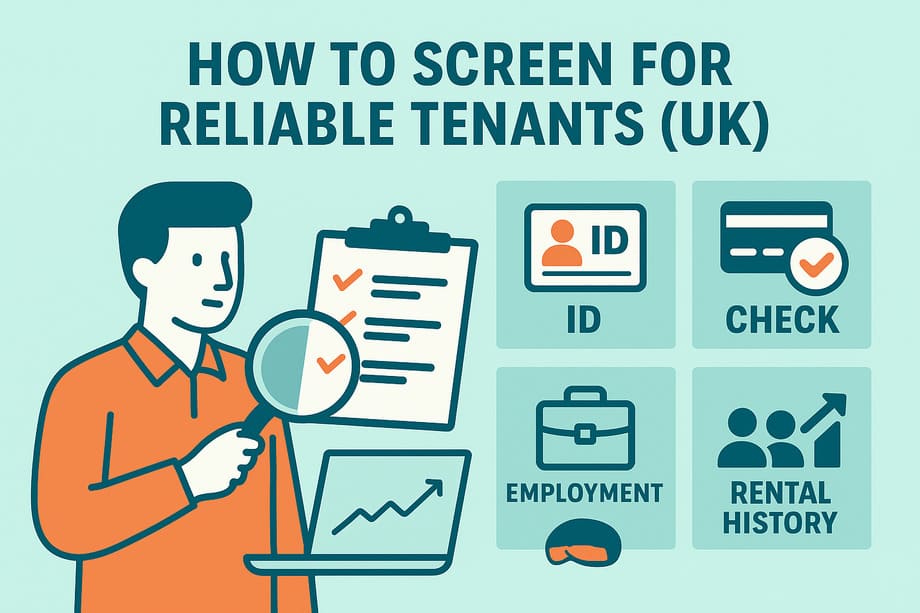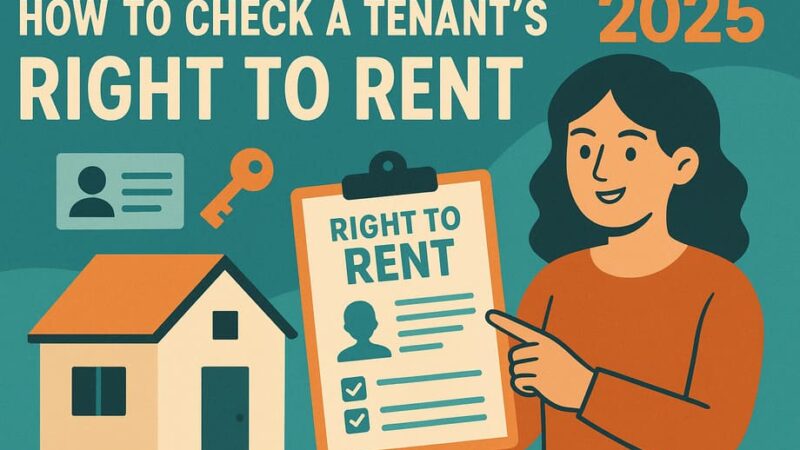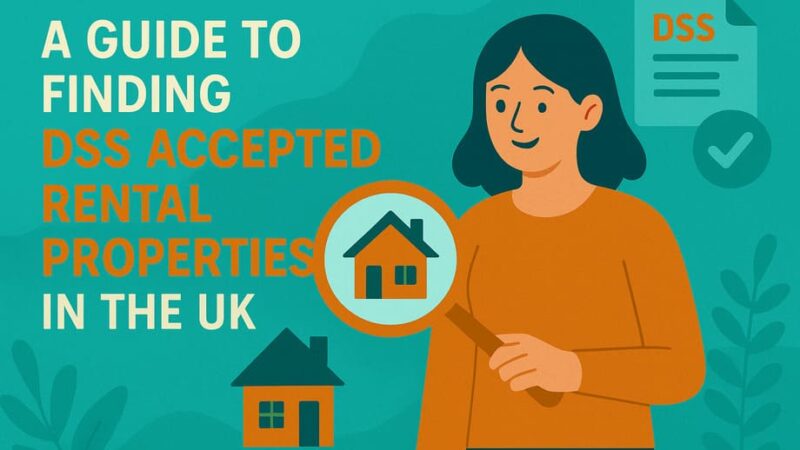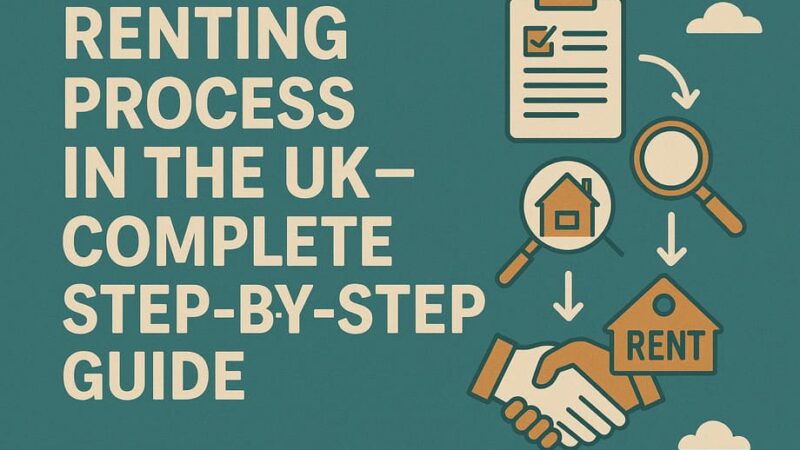How to Screen for Reliable Tenants – A UK Landlord’s Guide

Finding reliable tenants can make or break your experience as a landlord. I’ve learned this the hard way over years of letting properties thorough screening saves you from months of stress, unpaid rent, and property damage.
The difference between a good tenant and a nightmare tenant often comes down to how rigorously you screen applicants before handing over the keys. Skip the checks, and you’re gambling with your investment. Do them properly, and you’ll sleep soundly knowing your property is in good hands.
This guide walks you through the essential steps to screen tenants effectively, covering what actually works based on real landlord experience.
Why Tenant Screening Matters
Bad tenants are expensive. Really expensive.
According to data from major letting agencies, evictions cost landlords between £3,500 and £10,000 when you factor in legal fees, lost rent, and property repairs. The process takes 4-6 months on average, during which you’re often receiving no rent at all.
Beyond the financial hit, problematic tenants consume enormous amounts of time and energy. Chasing late rent payments, dealing with neighbour complaints, arranging constant repairs, and managing anti-social behaviour, none of this is what you signed up for when you decided to let property.
Thorough screening helps you:
- Reduce the risk of rent arrears and non-payment
- Minimise property damage and maintenance costs
- Avoid lengthy and costly eviction proceedings
- Maintain positive relationships with neighbours
- Protect your investment’s value
- Save yourself stress and hassle
Think of screening as insurance. Yes, it takes time upfront. But it’s far less time than dealing with a tenant who stops paying rent six months into a tenancy.
What Makes a Good Tenant?
Before you start screening, define what you’re looking for. While everyone wants tenants who pay on time and don’t trash the property, get more specific about your requirements.
Non-negotiable qualities:
- Financially stable with verifiable income (ideally 2.5-3x the monthly rent)
- Reliable payment history without CCJs or recent defaults
- Positive references from previous landlords
- Legal right to rent in the UK (if your property is in England)
- Respectful and communicative
Consider your property type:
A city centre one-bedroom flat attracts different tenants than a four-bedroom family home in the suburbs. Young professionals may prioritise location and modern amenities, while families focus on schools and gardens. Align your expectations with what your property naturally appeals to.
Important: You cannot discriminate against tenants based on protected characteristics under the Equality Act 2010—including race, gender, disability, religion, sexual orientation, or age. Base all decisions on objective criteria like income, credit history, and rental references.
How Long Does Tenant Screening Take?
The honest answer: it depends on how thorough you are and how responsive applicants are with documentation.
Typical timeline for self-managing landlords: 7-14 days
- Reviewing applications: 1-2 days
- Conducting viewings and initial conversations: 2-3 days
- Chasing and checking references: 3-7 days
- Running credit checks: 1-2 days
- Right to Rent verification: 1 day
- Making final decision: 1-2 days
Using professional referencing services: 2-5 days
Professional services like Homelet or Rentshield streamline the process significantly. They handle employment verification, credit checks, and landlord references simultaneously, providing comprehensive reports within 24-72 hours in most cases.
What affects timeline:
The biggest delays come from slow applicants who don’t provide documents promptly, previous landlords who take days to respond, and incomplete information requiring follow-up.
Here’s the crucial thing though: don’t rush. I know void periods hurt financially—empty properties generate no income. But a bad tenant costs far more than an extra week of vacancy. Quality trumps speed every single time.
Fraudulent rental applications are rising dramatically. In 2020, CIPFA estimated false tenancy applications cost the UK housing sector over £60 million. Taking time to verify everything properly protects you from becoming part of that statistic.
The Essential Tenant Screening Process
Here’s the systematic approach I use for every property I let. It’s proven reliable and catches issues before they become expensive problems.
Step 1: Set Clear Criteria and Advertise Properly
Define your requirements before you advertise. This creates your first filter and saves you from wasting time on unsuitable applicants.
Decide on:
- Minimum income requirement (I use 2.5x monthly rent as a baseline)
- Deposit amount (maximum 5 weeks’ rent for properties under £50,000 annual rent)
- Whether you’ll accept pets
- Whether you’ll consider benefits claimants
- Minimum tenancy length you’ll offer
- Move-in date flexibility
Include these criteria in your Rightmove, Zoopla, and SpareRoom listings. Be transparent upfront. If you require £30,000 annual income for a £1,000/month property, state it clearly. This prevents disappointment and time-wasting later.
Step 2: Use Application Forms to Pre-Screen
Never skip the application form. It’s your second screening filter and demonstrates serious interest.
Require everyone to complete a formal application before you’ll arrange a viewing. This immediately separates genuine applicants from time-wasters.
Essential information to collect:
- Full name, date of birth, contact details
- Current address and how long they’ve lived there
- Employment status, employer name, position, salary
- National Insurance number
- Number of occupants and any pets
- Current landlord contact details
- Reason for moving
- Preferred move-in date
Red flag questions to include:
- Have you ever been evicted? (Yes/No)
- Do you have any County Court Judgements (CCJs)? (Yes/No)
- Have you ever been declared bankrupt? (Yes/No)
If applicants don’t return completed forms within 2-3 days, they’re probably not serious. Move on.
Quick screening tip: Review applications against your criteria immediately. If someone earns £1,800 monthly and your rent is £1,000, don’t waste time on viewings—they can’t afford it. Reject politely and focus on suitable candidates.
Step 3: Conduct Property Viewings (Do This Yourself!)
This is the most important screening step, and where many landlords go wrong by delegating to agents.
Always conduct viewings personally. I cannot emphasise this enough. Viewing are your best opportunity to assess character, communication style, and whether you can work with this person.
During viewings, pay attention to:
Punctuality – Do they arrive on time? If they’re late, do they apologise or give notice?
Behaviour and respect – Do they wipe their feet? Treat the property carefully? Show basic respect?
Questions they ask – Interested tenants ask practical questions about heating costs, council tax, parking, local amenities. They’re thinking about actually living there.
Body language – Does something feel off? Trust those instincts.
Have a conversation. Don’t just show them around—chat naturally. Ask about their work, why they’re moving, what they’re looking for in a property. You’ll learn more from a 10-minute conversation than from any form.
I’ve learned to trust my gut. If something feels wrong during a viewing, even if the paperwork looks perfect, there’s usually a good reason. Your subconscious picks up on inconsistencies and red flags before you consciously identify them.
Step 4: Verify Right to Rent (England Only)
If your property is in England, conducting Right to Rent checks is a legal obligation. Failure to check can land you with fines up to £3,000 per tenant, or even criminal prosecution for repeat offences.
You must check:
- Original identity documents (not copies)
- All adults who will live in the property
- Documents from the approved list on GOV.UK
Acceptable documents include:
- UK/Irish passport (current or expired within 2 years)
- Biometric Residence Permit
- Share code from settled/pre-settled status (for EU/EEA nationals post-Brexit)
- Visa or immigration stamps in passport
Always make copies, date them, and store securely for the duration of the tenancy plus 12 months after it ends.
This doesn’t apply to properties in Scotland, Wales, or Northern Ireland (though checking identity is still good practice).
Step 5: Run Credit and Reference Checks
Credit checks and referencing reveal financial history and rental behaviour. This is where you verify everything applicants told you is actually true.
Use professional referencing services:
Homelet Referencing – £40-60 per tenant. Comprehensive credit checks, employment verification, landlord references. Reports within 24-48 hours.
Rentshield – £25-45 per tenant. Credit checks, identity verification, employment checks. Good value for straightforward cases.
Rightmove Referencing – £30-50 per tenant. Integrated if you advertise on Rightmove. Fast turnaround.
TDS Referencing – £35-55 per tenant. From the Tenancy Deposit Scheme. Reliable and thorough.
These services cost money, but they save enormous time and catch issues individual landlords might miss. They access databases you can’t reach and use fraud detection tools to identify fake documents.
What credit checks reveal:
- Credit score and payment history
- County Court Judgements (CCJs)
- Bankruptcies or IVAs
- Previous addresses
- Electoral roll registration
- Outstanding debts
- Financial associations
Don’t automatically reject poor credit. Consider context. A CCJ from 5 years ago with perfect payment history since might be less concerning than no credit history at all. Young tenants often have thin credit files rather than bad credit.
If credit is borderline, require a guarantor who passes their own checks.
Step 6: Verify Employment and Income
Confirm tenants can actually afford the rent. This is critical with rising living costs.
Request:
For employed tenants:
- 3 recent payslips
- Employment contract or offer letter
- Employer contact details for reference
- 3 months bank statements
For self-employed:
- Last 2 years SA302 tax returns
- Business accounts from accountant
- 6 months business bank statements
For benefit claimants:
- Benefit entitlement letters
- Payment schedules
- Bank statements showing payments
Check affordability: Monthly gross income should be at least 2.5-3 times the rent. For £1,000 monthly rent, look for £2,500-£3,000 gross monthly income minimum.
Watch for fake documents. Cross-reference payslips with bank statements. Real payslips show pence and proper tax calculations. If payslip amounts don’t match bank deposits, dig deeper or reject the application.
Step 7: Contact Previous Landlords
This is often the most revealing check. Past behaviour predicts future behaviour.
Ask previous landlords:
- “Did [tenant name] rent from you from [dates]?”
- “Did they pay rent on time and in full every month?”
- “Were there any late or missed payments?”
- “Did they maintain the property well?”
- “Were there any issues with neighbours or complaints?”
- “How much notice did they give before leaving?”
- “Did they return the property in good condition?”
- “Would you rent to them again?“
That final question is crucial. If a previous landlord hesitates or says no, find out why.
Be wary of overly positive references. Some landlords provide glowing references just to get rid of problem tenants. Listen for hesitation, vague answers, or evasiveness.
Step 8: Make Your Decision (Trust Your Instincts)
After all the checks, combine the data with your gut feeling.
If the paperwork looks perfect but something felt wrong during the viewing, trust that instinct. If credit is slightly borderline but everything else is strong and they were professional throughout, they might still be a good choice.
Final checklist before accepting:
- Income meets 2.5-3x rent requirement
- Credit check shows no major red flags
- Previous landlord would rent to them again
- Employment verified and stable
- Right to Rent confirmed
- Bank statements show financial stability
- Personal impression during viewing was positive
If you’re uncertain, it’s usually better to reject and wait for the next applicant. Don’t fill vacancies out of desperation, that’s when you make expensive mistakes.
Red Flags to Watch For
Some warning signs should make you think twice or investigate further.
Communication red flags:
- Takes days to respond to simple questions
- Evasive or vague answers to direct questions
- Pushy behaviour trying to rush the process
- Aggressive or entitled attitude
- Late to viewings without apology
Financial red flags:
- Income insufficient for rent (below 2.5x ratio)
- Multiple recent CCJs or defaults
- Reluctant to provide financial documents
- Cannot afford deposit
- Currently in arrears with existing landlord
- Gambling problems evident in bank statements
History red flags:
- Previous eviction (almost always a deal-breaker)
- Cannot provide previous landlord references
- Frequent moves every 6-12 months
- Inconsistent employment history
- Fake or altered documents
Behavioural red flags:
- Asking to skip screening steps
- Offering extra rent to skip checks
- Bad-mouthing multiple previous landlords
- No questions about the property
- Inconsistent information across forms
If you spot multiple red flags, walk away. One isolated issue might be explainable; multiple issues suggest problems ahead.
Common Screening Mistakes to Avoid
I’ve made these mistakes (and seen other landlords make them). Learn from our errors.
Mistake 1: Rushing to fill vacancies
Void periods hurt, but bad tenants hurt more. One month’s lost rent is better than six months of non-payment and eviction costs.
Mistake 2: Not meeting tenants face-to-face
You miss crucial behavioural cues. Always meet them, even if just via video call. Chemistry matters in landlord-tenant relationships.
Mistake 3: Ignoring gut instincts
If something feels wrong despite good paperwork, trust that feeling. Your subconscious often detects problems before you consciously recognise them.
Mistake 4: Not checking guarantors properly
A guarantor in financial difficulty provides no security. Always credit check and verify guarantor income just as thoroughly as the tenant.
Mistake 5: Believing everything without verification
Anyone can claim to earn £50,000 on an application form. Verify everything directly—contact employers, cross-reference documents, speak to landlords.
Legal Requirements UK Landlords Must Follow
Right to Rent (England only)
You must check all adult occupants have legal right to rent before tenancy begins. Keep copies of documents for duration of tenancy plus 12 months.
Penalties: Up to £3,000 civil penalty per tenant, or criminal prosecution (unlimited fines and imprisonment) for serious breaches.
Equality Act 2010
You cannot discriminate based on: race, gender, disability, sexual orientation, religion, age, pregnancy, or marital status.
You can reject based on: insufficient income, poor credit history, negative references, lack of Right to Rent.
Tenant Fees Act 2019
You cannot charge tenants for referencing or credit checks (except for specific circumstances). You absorb these costs or factor them into rent.
Data Protection (GDPR)
Store applicant data securely, only collect what’s necessary for screening, delete data when no longer needed (typically 12 months after tenancy ends for unsuccessful applicants).
Useful UK Tenant Screening Tools
Professional Referencing Services:
- Homelet (homelet.co.uk) – £40-60 per tenant
- Rentshield – £25-45 per tenant
- TDS Referencing – £35-55 per tenant
- Rightmove Referencing – £30-50 per tenant
- Let Alliance – £35-55 per tenant
Property Management Software:
- Landlord Vision – Full property management with screening features
- OpenRent – DIY platform with built-in referencing
- Goodlord – End-to-end tenancy management
Legal Compliance Resources:
- NRLA (National Residential Landlords Association) – Templates, guides, legal updates
- GOV.UK Right to Rent guidance – Official documentation
- Shelter England – Tenancy law information
Frequently Asked Questions
How long should tenant screening take?
Self-managed screening typically takes 7-14 days, while professional referencing services deliver results in 2-5 days. Don’t rush the process to save a few days—thorough screening prevents problems that cost thousands of pounds and months of stress. The timeline depends mainly on how quickly applicants provide documents and references respond.
What’s the minimum income a tenant should have?
Most landlords require gross income of 2.5-3 times the monthly rent. For £1,000 monthly rent, look for £2,500-£3,000 monthly gross income (£30,000-£36,000 annually). This ensures tenants can comfortably afford rent while covering living expenses. If income is borderline, require a guarantor who passes their own affordability and credit checks.
Can I reject tenants with bad credit?
Yes, you can reject applicants with poor credit scores, CCJs, or bankruptcy if you have legitimate concerns about their ability to pay rent. However, consider the context, old issues may be less relevant than recent payment patterns. Young tenants may have thin credit files rather than bad credit. Always apply criteria consistently to all applicants to avoid discrimination claims.
Do I have to check Right to Rent for properties outside England?
No, Right to Rent checks are only legally required for properties in England. They don’t apply to Scotland, Wales, or Northern Ireland. However, verifying identity is still good practice regardless of location to protect yourself from fraud and ensure you know who’s living in your property.
Should I use professional referencing services or do it myself?
Professional services (£25-60 per tenant) save enormous time and catch fraud you might miss. They access databases unavailable to individuals and provide comprehensive reports within 24-72 hours. For landlords with multiple properties or limited time, they’re worth every penny. If you only have one property and plenty of time, DIY screening works but requires more effort and diligence.
Key Takeaways
Screening tenants properly is the single most important thing you can do as a landlord. It’s not optional—it’s essential protection for your investment.
Follow a systematic process for every applicant. Don’t skip steps to fill vacancies faster. Bad tenants cost far more than short void periods.
Meet tenants in person. Viewings reveal character and communication style that forms never capture. Trust your instincts when something feels off.
Verify everything. Check payslips against bank statements, contact employers and landlords directly, use professional services to catch fraud.
Comply with the law. Conduct Right to Rent checks (England), avoid discrimination, follow data protection rules. Non-compliance brings heavy penalties.
Focus on affordability. The most important criterion is whether tenants can comfortably afford rent (2.5-3x income minimum). Financial stability predicts payment reliability better than anything else.
Use professional services when appropriate. They cost money but save time and provide comprehensive checks individual landlords can’t match.
Thorough screening requires patience and effort, but the payoff is significant: reliable rent payments, well-maintained property, minimal stress, and protection of your investment value. Take it seriously, and you’ll thank yourself later.
Last Updated on October 23, 2025 by James Cartwright







